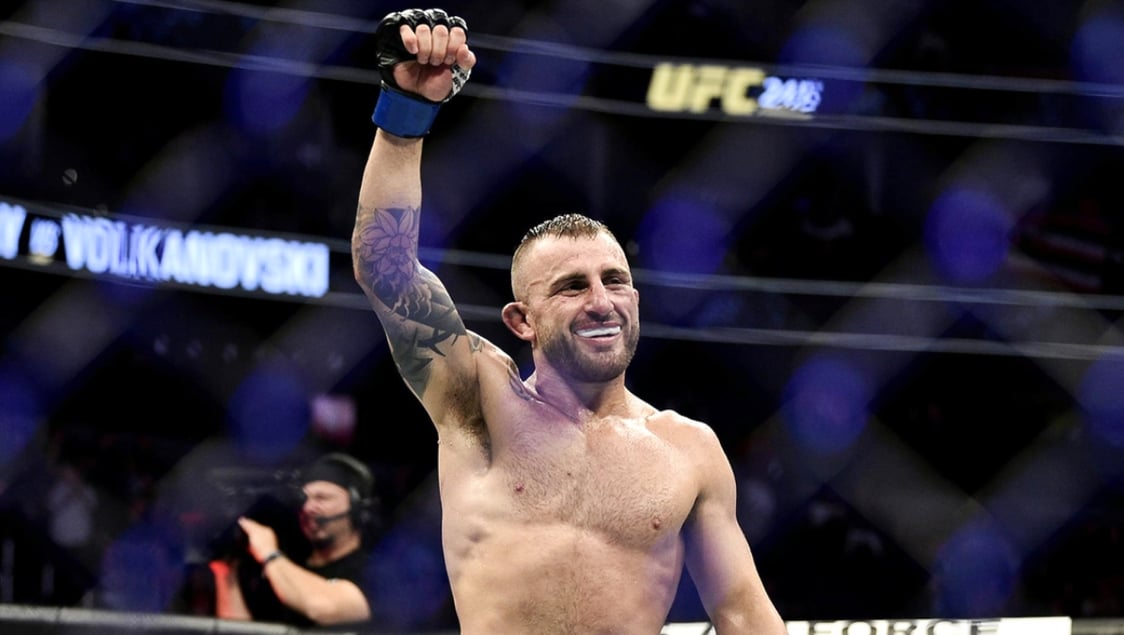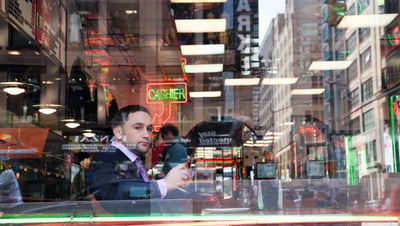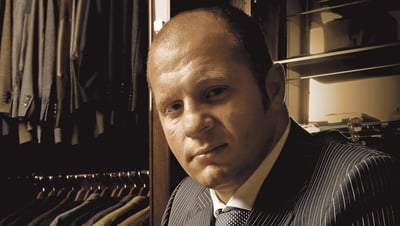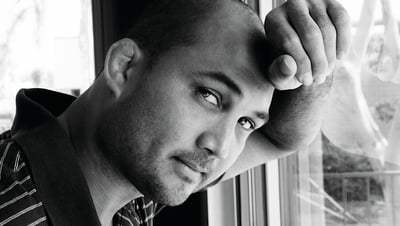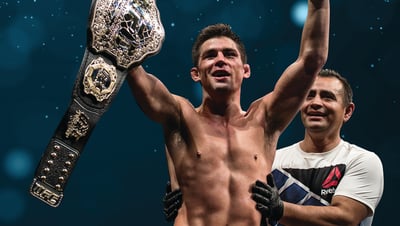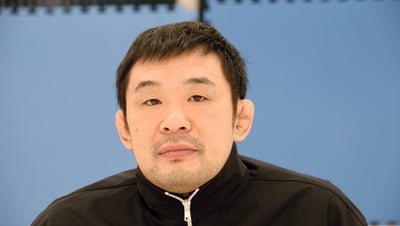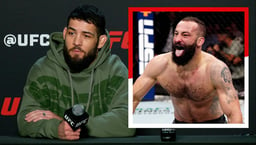
Issue 201
January 2024
Former UFC featherweight champion Alexander Volkanovski has racked up records during his career. Despite a recent loss to Illia Topuria there's still an argument that he'll remain the featherweight GOAT. Fighters Only's man in Australia Ray Klerck looks at what makes him such an enduring champion.
Sport is the steel in Australia’s spine. Whether it’s rugby, Australian rules, soccer, or cricket, Down Under is obsessed, sometimes divided, by an array of athletic allegiances. Alexander Volkanovski stands atop the middle high ground of this country’s competitive sporting mosaic. He has transcended Australian rivalry and become the nation's unifying beacon. Not only is he the best-ever Australian fighter, but he’s also the friend most MMA fans would love to sink a cold beer with. The guy is quick-witted, loves to cook, is a devout family man, will motivate you, and could get you out of a pickle if you needed a hard-hitting buddy at the bar. It's no surprise Mark Zuckerberg saw him as the ultimate squad goal. Adored across Australia, Volkanovski has gone on to collect a worldwide audience of fans because few can compare to his high-fructose charisma. He’s the kind of fighter you love to see put the high vis on and go to work, in and out of the Octagon.
The division of champions
Volkanovski may currently occupy third place in the pound-for-pound rankings, but he continues to rest at the top of the UFC’s most competitive weight division. Featherweight has been a stomping ground for reputations, collecting greats like Holloway, Aldo, and McGregor, but Volk may be better than all of them. Aldo was undefeated for over 10 years with 18 consecutive victories, but Volkanovski has racked up 22 successive featherweight wins over 9 years. These two fighters are comparable by every degree, with Volk getting a slight edge. Alexander "The Great" by name and nature because his journey demands your attention. His ability, toughness, and, more notably, a fight IQ that is tighter than an occy-strap on a trailer, are probably the best of any active MMA fighter. To understand how he got this way, we’ve broken down his skill set into the things that have made him one of a kind.
Windang or bust
Volkanovski comes from the tiny coastal town of Windang, an hour and a half drive from Sydney. He’s famously touted as a rugby player turned MMA fighter. Many don’t know that he was first a wrestling national champion at 12 years old, which he gave up to pursue a rugby league. His progression is fighter, rugby, then back to fighter. Windang is slap-bang in the middle of Australia’s rugby league heartland, and it was a wise decision to shift his focus away from wrestling. “I played for Warilla Gorillas; it was just where all my mates played,” says Volkanovski, looking back. “Me being reasonably short, I played in a position where people were twice the size of me, and I used to be 214lbs. I played prop, a front rower, and that was my position. Pass me the ball and just run straight at them.” Despite standing 5’6, he’d excel against every other team’s front rower forwards who were 6-foot-plus heavyweights. As you might imagine, his physicality and attitude led his team to multiple grand final victories regardless of the height disadvantage. He was so dominant that in 2010, he was awarded the Mick Cronin Medal as the league’s best player. Front-row forwards, like Volkanovski, have to blast their way through tackles while making the biggest tackles at crucial moments in the game.
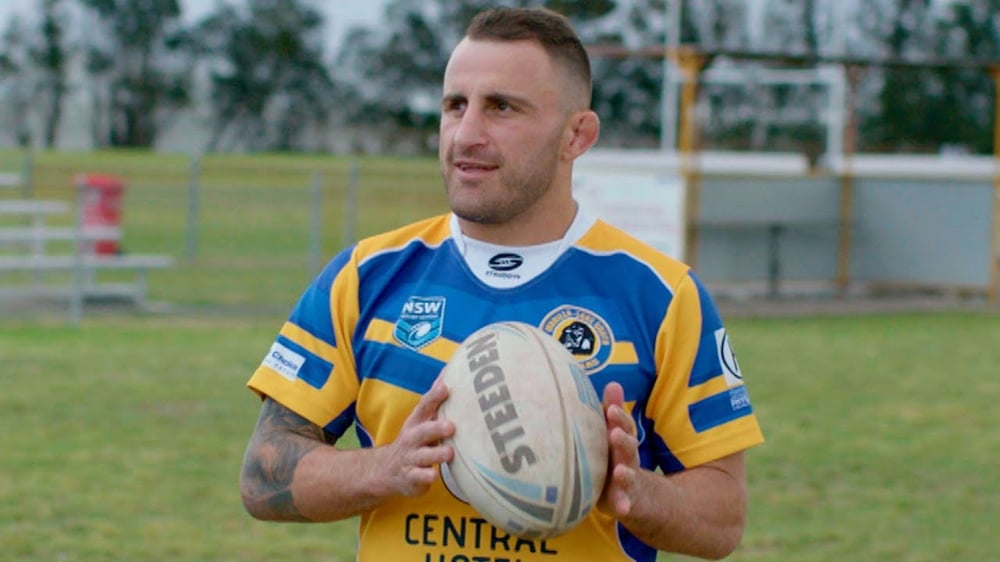
Rugby-level pain tolerance
In the front row, Volkanovaski occupied a similar positional niche as an NFL linebacker. The difference is that in rugby, you need to be able to sprint, tackle, pass, and think critically for 80 minutes. It’s one of the few sports that demand explosive power applied in an endurance setting, which reveals the perfect skillset dovetail between contact and combat sports. Pain management is the next element of his persona to consider because Volkanovski seems to have cultivated an agony-off switch hardwired by a commitment to a team. Athletes who play contact sports aren’t hampered by pain because they appear to have adapted to it and don’t lose their athletic coordination in response, found research Psychology of Sport and Exercise. Conditioning by the hits of a thousand tackles, his pain tolerance has been carefully curated through years of exposure. This trait has helped him adapt his attitude to the demands of both sports.
“I wrestled before rugby league, so I always had a pretty good wrestling background, a good base, and that helped with my football. It just meant my balance was always so good; a strong core, good hips, and just things like that just really played a factor in how I ran the ball and tackled.” It’s clear he’s spent a lifetime nurturing expertise around the man-on-man aspects of both disciplines. He became accustomed to tackling 230lb rugby players, so a 136lb featherweight is easy for him to shrug off. Pay attention to his post-fight interviews. You’ll note that despite the post-fight pain, he stands at ease. Okay, that might be because he’s been known to down a ‘shoey’. That’s Australian for drinking a celebratory beer out of your shoe.
Tackles versus takedowns
Tackling in rugby has taken plenty of pointers from MMA skills. The national Welsh, English, and New Zealand rugby union sides have used judo, jiu-jitsu, and wrestling to improve tackling for almost 15 years. These skills help rugby players get out from underneath bigger opponents. It also teaches them how to control an opponent’s hips with the arms while driving with the lower body. These are skills that served Volkanovski.
"Five-foot-five, five-foot-six if I'm lucky, and 97kg - as you can imagine, I was pretty hard to tackle," he told the Herald. "It's made me a strong type of guy. I'm used to them big boys there, and even now, when I fight these featherweights, I've always been used to wrestling and going against the bigger boys, so it's made me tough, and even maybe confidence-wise, it helps. It's a tough sport. It's not easy, so it's rolled into MMA pretty well and made me who I am today. I'm glad I was a part of rugby league, but I'm glad I made the change because look at me now. It's been a pretty crazy journey."
While many rugby players have turned to MMA to help improve their tackling game, Volkanovski is probably one of the first fighters to lean on his rugby background to improve his MMA game. This is largely thanks to the unique brand of power he’s always brought to sports.
A heavyweight in a featherweight body
Strength remains the line in the sand in MMA because the person who can apply the most force to their opponent has a massive advantage. It’s one of the main reasons why combat sports have weight classes. At his rugby-playing peak, Volkanoski weighed a monstrous 214lbs, which he proudly displays on his Instagram with the caption: “Ever wondered what a featherweight would like fighting at light heavyweight?” In the picture, he’s sporting traps so big they could catch bears, a throwback to the days when he lived the heavyweight lifestyle.
At 5’6 tall, that’s a lot of strength packed into a very compact frame. He wouldn’t have been a stranger to the iron to get to this point. “Alex is super-strong,” says strength coach Chris Jaffrey. “There’s no one stronger in his division.” And you can bet much of that heavyweight rugby league strength has only grown despite a dramatic fat loss thanks to cutting out processed foods. He’s a heavyweight rugby player compacted into a featherweight body while retaining all the latter's strength. When you look at it from this perspective, it goes a long way to explaining his big-man confidence and charisma.
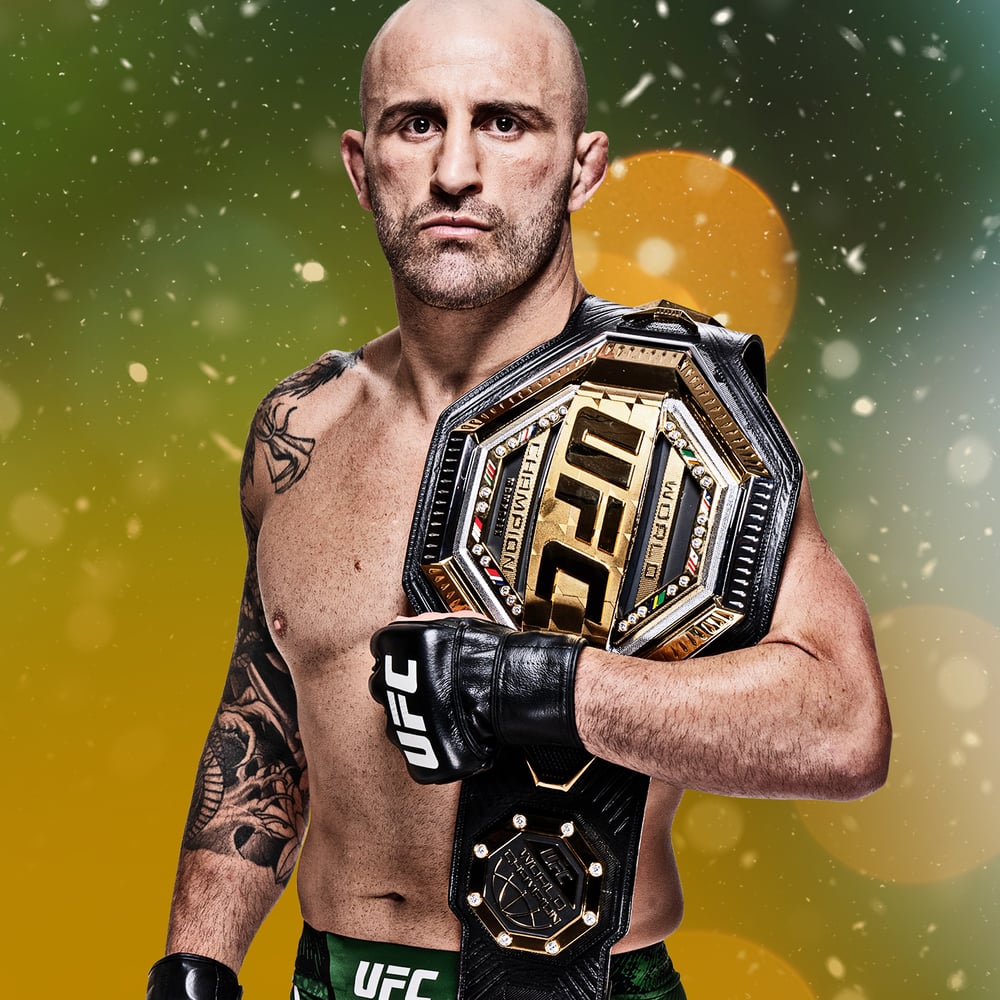
The 'Good Guy' mindset
Volkanovski is everything MMA wants in a gentlemanly ambassador. Villains might bring the bad blood that makes bouts exciting, but being the hero is his chosen position because it’s his authentic personality. In 2017, he set his intention these words in a post-fight press conference, "I think I’m going to call for two things," he explained. "I pride myself on being the good guy. I’m a loyal type of family man. Everybody’s playing the bad guy nowadays, so I’m going to say, ‘It’s time the good guys make some money.’ Give me that 50g’s, and let me fix up some of these bad boys. Here’s one for the good guys.” He made the call. The UFC took notice. Both parties followed through and gave the fans plenty to shout about. Was it the right decision without a worthy featherweight villain? Perhaps, considering a University of Michigan study, people more often reported that villains were inwardly good and that heroes were inwardly bad. People judged that villains were more likely than heroes to have a true self that differed from their outward behavior. Does Volkanovski have a dark side? Definitely, but it only gets released at the right moments in the octagon.
Inner battles
Volkanovski comes from Windang, a tiny town with less than 3,000 people. Acting like a dickhead in a tight community will see you pulled in line very quickly. “I'm still learning so much about myself and understanding this whole thing,” Volkanovski told foxsports.com.au when quizzed about his rise to fame. “Remember, I’m just a regular bloke that didn’t know much from a small town. I don’t get a lot of the stuff that comes with being a UFC champion. Hate was one of them. I didn’t get it, and I’ve always been a people pleaser. I’d put myself in a worse position to make other people happy. It’s just how I am, being that people pleaser. Whereas now I’m like, I’m going to have to be a little more ruthless. I’m never going to be a c***. I’m never going to be that guy. But it’s just something I’ve definitely overcome. And I don’t sit there and do my head in over the littlest things. “Everyone who knows me tells me ‘you’re too nice’. Well, it’s true, man. “I’m always going to be nice and friendly; it doesn’t mean I’m a pr*ck now. I’ll never be that guy. But I’m not going to be walked over.” He carefully balances the line between good and evil as and when he needs to - a true yin-yang warrior. Next time he fights, note how he activates the inner villain during a fight but then respects his opponents afterward. This champion mindset is built by the influence of having the right people around him, like Joe Lopez.
The bond with Joe Lopez
The fighter-coach relationship is often the critical factor in a fighter's success. For Volkanovski, this guiding relationship came in the form of Joe Lopez. They have a clear friendship built on the Australian way of being brutally frank (aka friendly insulting) with one another. “It's pretty incredible to be with the same coach, working things out together, being able to go and travel,” Volkanovski said. “The sport wasn't massive [when we started], so we don't know everything. But to have someone like Joe comfortable to come with me to Thailand, New Zealand, where we built that knowledge together. No one knows my style better than Joe. So we bring things in. Yeah, this works, and no, it doesn't. If I do a spin kick, Joe would tell me, ‘What are you doing? Don't you ever throw that again,’ All right, we ain't throwing that again. He'll pull me up when need be, but we end up finding the perfect formula for my style, and we've been able to do that together.” Lucky for the world, Lopez was in tune enough to see Volkanovski’s potential from day one.
A trial day
Lopez’s gym, Free Style MMA, had a trial day, offering a pretty cool origin story for Volkanovski. “Alex had been training, and we had an open day at the gym, where we'd had a seminar, and then we were going to do some open sparring,” Lopez said. “Alex was pretty green. I think it was, like I said, his first spar. I had a heavyweight, and there was a heavyweight from the area that was 5-0, and he was the next best upcoming guy. I was gloving up my heavyweight, and I was going to let them do a couple of rounds. Then, once they got a bit tired, I was going to put Alex in. But the other guy's coach put Alex in there. I tried to stop the spar, but it already started. Next minute, Alex submitted this guy. In a couple of minutes, I thought, 'This kid's got something.” Joe Lopez, a master tactician and motivator, recognized Volkanovski's potential and took him under his wing. Together, they took on the world and saw them land at the pinnacle of the sport.
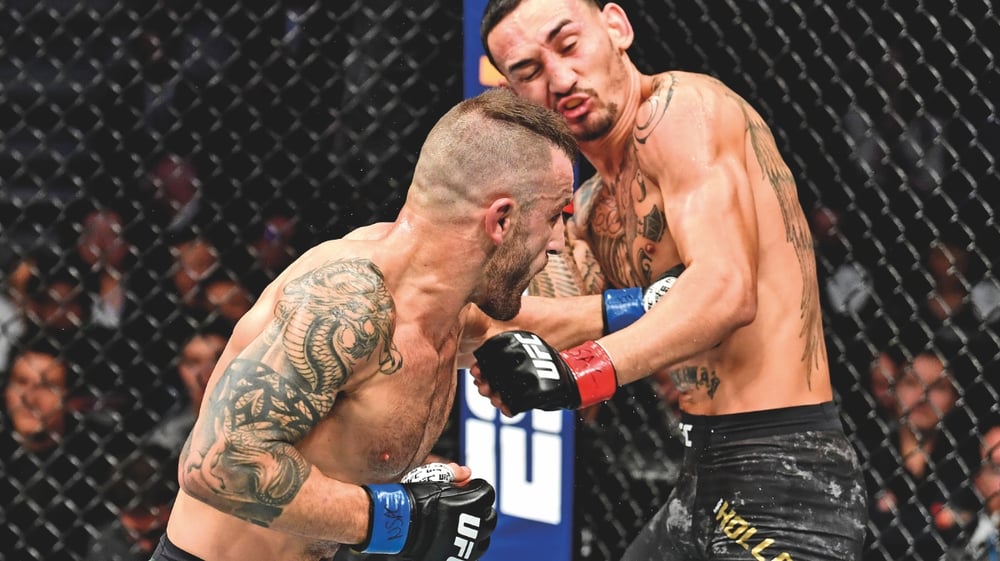
A meteoric ascent
Volkanovski and his team are now seasoned professionals, but their ability to rise during the big moments that have defined his legacy. The first big moment was against Chad Mendes, a fighter with plenty to prove and a similar style to Volkanovski. This slugfest put Volkanovski on the fan's radar, especially coming back after absorbing a knockdown from Mendes in the second round. Next, he took out Aldo in the Brazilian’s backyard, a feat considered near impossible. Finally, the title bout with Holloway stirred up plenty of debate that caused a threepeat. While title wins are supposed to be the be-all and end-all, Volkanovski’s crown jewel is the Ortega title defense. With either man coaching either side of The Ultimate Fighter, what ensued was one of the most thrilling featherweight title fights in UFC history as Volkanovski showcased his grit, determination and a steadfast refusal to quit that saw him survive a number of Ortega’s submission attempts before eventually battering his man from pillar to post en route to a landslide unanimous decision victory. That performance gave fans a moment that would never be forgotten.
Daring to be great
Ruling the world at 145 pounds is a huge achievement in itself, but Volkanovski's willingness to step outside of his comfort zone and go for gold in the next weight class up shows the sort of gutsiness that has been a hallmark of his career.
After a callout from lightweight champion Islam Makhachev – a huge lightweight whose frame could easily carry him to contender status at 170 pounds – Volkanovski didn't hesitate. He stepped into the Octagon and accepted Makhachev's challenge to his face.
Their bout at UFC 284 in Perth, saw Volkanovski lose out via unanimous decision. But, as the fight came to a close, only one man was in the ascendancy – Volk.
In the aftermath of that night, Volkanovski watched back his performance and tweeted, "Just watched the fight, I definitely think I won 2,3 and 5. Surprised I didn’t get my hand raised! Let’s do the rematch, anywhere, anytime!"
Sometimes, when fighters say things like that last sentence, they don't always mean it. But, when a cut in sparring ruled Charles Oliveira out of the UFC 294 title fight with Makhachev, the UFC needed a replacement on less than two weeks' notice. Volkanovski got the call, said yes, got off the couch and headed to Abu Dhabi to face Makhachev again. This time, the outcome was crushingly different. A head kick from the Russian knocked Volkanovski down and out as he suffered the first clean knockout loss of his career.

Showing his human side
Following his knockout loss to Makhachev, Volk shared rare emotion in his post-fight press conference, and he later explained why he had reacted in such an unexpected way in the aftermath of that defeat.
"That was raw emotion you seen," he explained in a video on his own YouTube channel.
"But I want everyone to know I’m OK, as well. I think people have got to remember that obviously, I did have a bit going on. I just got tagged, I just got knocked out. I lost. Obviously, legacy-wise, all these things are coming into play, and that was obviously hurting.
"One thing I do want to say, even though I’m fine, I’m sort of glad you got to see that sort of raw emotion and we do touch on the mental side of things when it comes to everyone, not just fighting, athletes, men, anyone in general. I think it’s good for awareness. I think these are conversations people should be having.
"I do want to clear the air, I was struggling the last few months. The newborn, surgery, not being in the gym as much as I would like, and trying to be the best father I can be, (it) can take away a lot from the training, especially when you’re coming off injuries. So I wasn’t able to be in the gym as much as I like, which sometimes can make things a little more difficult.
"Two things that are most important to me: my family and my career. That’s how I look after my family. They’re my two purposes in life, providing for my family and how I do that is my fighting. I’m in my prime and sometimes you put a bit of pressure because I know I need to make the most of me in my prime because my days are numbered.
"Me and my wife, we’re great, again got a beautiful family life, we’re all good so I want everyone to know that. I don’t want everything thinking that it’s not like that. It’s me trying to deal with being a high-performance athlete and not being able to fulfill that side of things, especially the last few months."
That willingness to open himself up like that shows Volk's strength of character, and endears him further to his fanbase, who see him as a down-to-earth guy who they'd love to have a beer with. It just so happens that he's also one of the best fighters on the planet.
The undisputed king
In every battle, every round, and every training session, Volkanovski epitomizes the essence of a people's champion. His loyalty to his gym, his unwavering bond with coach Joe Lopez, and his commitment to family, combined with his relentless pursuit of greatness, sets him apart. Sitting on the cusp of GOAT status, Volkanovski's legacy will forever be etched in the annals of the sport. His journey from the rugby fields of Windang to the throne of the UFC's featherweight division is a tale of grit, determination, and the unyielding pursuit of excellence. You can bet his legacy will continue to captivate and inspire fighters and fans for generations as he transitions from “The Great” to “The Greatest”.
...
